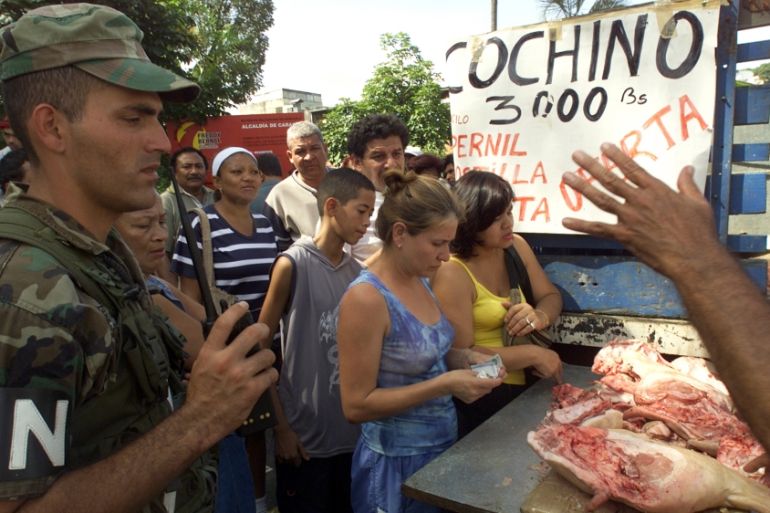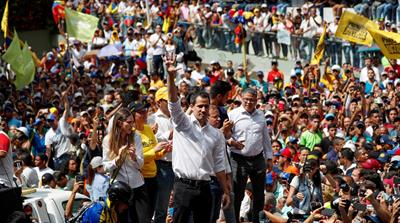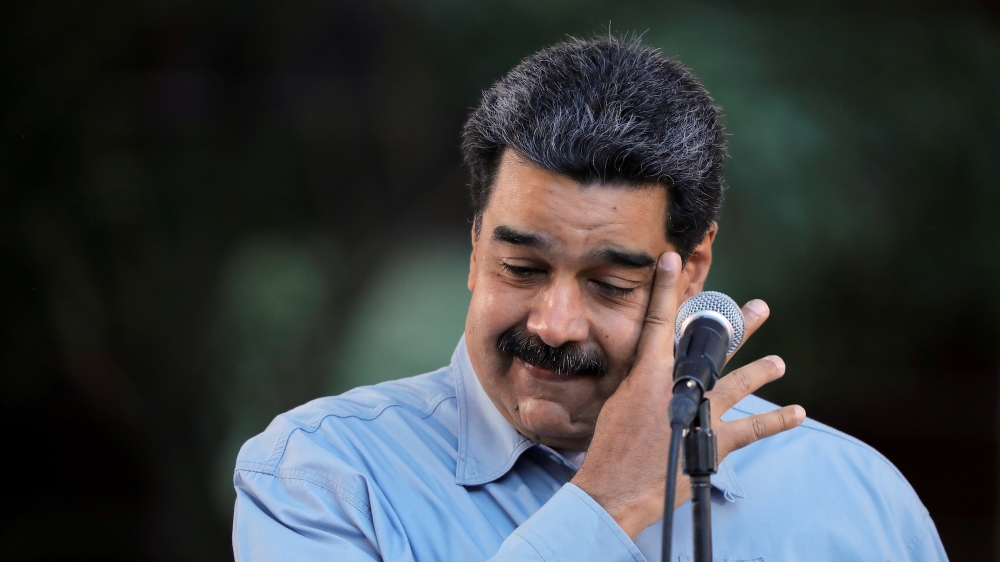Venezuela’s ‘pork leg’ politics highlight Russian influence
The intrigue surrounding pork legs points to the intersection of forces shaping Venezuelan life in 2020.

Everyone seems to be talking about pork legs in Venezuela, demanding to know where they are being sent, where they are being imported from, and who is ultimately getting them. The intrigue surrounding this particular cut of meat highlights the intersection of forces shaping Venezuelan life in 2020: a battle for control of parliament, severe undernourishment, United States sanctions, and Russia’s growing influence in the South American country.
Carmen Graffe is a retired public school teacher. In December, she was hoping to snag some of the pork that President Nicolas Maduro promised his people for their end-of-year celebrations, but getting the free meat was not easy.
Keep reading
list of 4 itemsVenezuela opposition figure Guaido in Colombia ahead of summit
Venezuelan court issues warrants for new opposition leaders
Venezuelan government, opposition to resume political talks
“It’s humiliating how [we the] retired who are already over 70 must queue for hours to get food,” Graffe told Al Jazeera. She was one of about 500 people who stood in line for up to 11 hours at a distribution centre on December 11, hoping to get meat imported from Russia. The scene underscores the severity of the country’s economic and food crisis.
Undernourishment has significantly increased in Venezuela in recent years, according to the United Nations, with the portion of the Venezuelan population that is undernourished rising from 6.4 percent between 2012 and 2014 to 21.2 percent between 2016 and 2018.
“You attend without knowing what they will give you, but you have no other choice because with the money [that the state] gives [me] monthly after 30 years of working, I can’t even buy two kilos of meat,” Graffe said as she cooked the rice, beans and fried bananas that she felt grateful to have because so many people have far less.

After Graffe’s three-decade career as a teacher, her monthly state pension is only equivalent to about $8 – barely enough for her to buy sufficient amounts of the pork that is such a central part of big family gatherings in Venezuela.
The “pork battle”, as this chapter of Venezuela’s crisis is known by its people, is only one of several challenges facing Maduro’s government.
Dozens of countries recognise opposition leader Juan Guaido as Venezuela’s interim president. Just this month, the 36-year-old was re-elected president of the National Assembly of Venezuela for a second one-year term. All this comes despite Maduro loyalists trying to physically block the US-backed Guaido from entering parliament so that his former ally Luis Parra could be sworn in as congressional chief. The US punished Parra and other Maduro loyalists for their role in this attempted shake-up with a fresh round of sanctions directly aimed at the politicians.
Pork as a political tool
Maduro’s administration started giving away holiday pork about three years ago as part of a promise to deal with chronic hunger and undernourishment, but securing and paying for the pork proved very difficult. While the president’s promise offered hope to hungry Venezuelans, some years, many were left wondering “Where is my pork?”.

At first, a private Portuguese company supplied the meat. But it refused to do so in 2017. Maduro accused the Portuguese of sabotaging the pork giveaway. For its part, the meat supplier claimed it had to stop making deliveries because the Venezuelan government never paid the 40 million euros ($44.6m) it was owed for the 2016 shipment.
In late 2017, the Venezuelan regime promised to distribute 2,000 tonnes of pork for the holiday season – enough to feed only about 20 percent of the population. But the meat never arrived. Maduro’s regime blamed the Colombian government for the shortage, saying it had closed off the two countries’ shared border so the imports could not come through.
The 2018 pork giveaway was also disappointing. Not only was the meat sparsely distributed, but it was also of low quality. This is when Moscow stepped in.
In November 2019, a new deal with Russia made it possible for Maduro to commit to distributing some 13,500 tonnes of pork at a cost of almost 12 million euros ($13.4m). It was enough meat to feed everyone who wanted to eat a holiday meal.
“I approve [those funds] immediately to guarantee the people a balanced December, with their pork legs, and whatever our people need,” Maduro told the country in a televised address.
Russian deals circumvent US sanctions
In August 2019, the US issued an executive order placing Venezuela on its Office of Foreign Assets Control list. “President Trump has sanctioned Maduro’s financial lifelines, including the Venezuelan Central Bank, the Venezuelan Development Bank, and Petroleos de Venezuela,” read a statement issued by the US Department of State.
During the past two years, Venezuela has paid $5bn to Russia, and that is the only debt that has been honoured.
US sanctions against Venezuela are designed to “isolate Maduro’s regime from the global financial system”, according to a statement issued by Trump’s government. The US can do this because its banks and currency play central roles in global finance, facilitating cross-border transactions for governments, businesses, assorted entities and individuals.
By ordering its banks not to process Venezuelan transactions, the US drastically reduced the country’s options for trade, which increased the value of the Latin American nation’s relationship with Russia.
In April 2019, Yomana Koteich, Venezuela’s Minister of International Trade, told state-owned news channel Russia Today that the two countries were halting transactions in US dollars and moving to local currencies and the euro.
By October 2019, Moscow and Caracas had signed 264 cooperation agreements across 20 different strategic areas. They also struck $4bn in economic, technological, and military deals.
Angel Alvarado, an opposition leader and member of the National Assembly, the country’s legislative body, said Russia’s support has played a key role in helping Maduro’s regime stay in power despite the wide recognition that Juan Guaido has around the world as the country’s interim president.
It is because transactions between Caracas and Moscow bypass the US that Maduro was able to get around the sanctions and pay for the pork.
“During the past two years, Venezuela has paid $5bn to Russia, and that is the only debt that has been honoured [by the regime],” Alvarado told Al Jazeera.
“Out of these billions of dollars, the payment of the pork legs is something almost marginal,” he said. “The reality is that Venezuela is still in a deep nutrition and healthcare crisis.”
Holiday pork is unlikely to solve the country’s food, economic and health crises. Yet that is what makes the pork battle all the more significant. It speaks to the need to influence voters who are not only angry and anxious, but also weakened by hunger.
Sergio Held contributed to this story out of Bogota, Colombia.